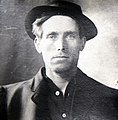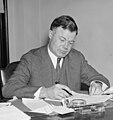
Portal:Organized Labour

Introduction

- In trade unions, workers campaign for higher wages, better working conditions and fair treatment from their employers, and through the implementation of labour laws, from their governments. They do this through collective bargaining, sectoral bargaining, and when needed, strike action. In some countries, co-determination gives representatives of workers seats on the board of directors of their employers.
- Political parties representing the interests of workers campaign for labour rights, social security and the welfare state. They are usually called a labour party (in English-speaking countries), a social democratic party (in Germanic and Slavic countries), a socialist party (in Romance countries), or sometimes a workers' party.
- Though historically less prominent, the cooperative movement campaigns to replace capitalist ownership of the economy with worker cooperatives, consumer cooperatives, and other types of cooperative ownership. This is related to the concept of economic democracy.
The labour movement developed as a response to capitalism and the Industrial Revolution of the late 18th and early 19th centuries, at about the same time as socialism. The early goals of the movement were the right to unionise, the right to vote, democracy and the 40-hour week. As these were achieved in many of the advanced economies of western Europe and north America in the early decades of the 20th century, the labour movement expanded to issues of welfare and social insurance, wealth distribution and income distribution, public services like health care and education, social housing and common ownership. (Full article...)

Selected article
Service Employees International Union (SEIU) is a labor union representing almost 1.9 million workers in over 100 occupations in the United States and Canada. SEIU is focused on organizing workers in three sectors: healthcare (over half of members work in the healthcare field), including hospital, home care and nursing home workers; public services (government employees, including law enforcement); and property services (including janitors, security guards and food service workers).

SEIU has over 150 local branches. It is affiliated with the Strategic Organizing Center and the Canadian Labour Congress. SEIU's international headquarters is located in Washington, D.C., and it is one of the largest unions in the country.

The union is known for its strong support for Democratic candidates. It spent $28 million supporting Barack Obama in the 2008 presidential election. In 2012, SEIU was the top outside spender on Democratic campaigns, reporting almost $70 million of campaign donations, television ads and get-out-the-vote efforts in support of President Obama and other Democrats. SEIU is a major supporter of the Affordable Care Act and of increased minimum wage laws, including wage increases for fast food workers. The union is the primary backer of the Fight for $15. (Full article...)

November in Labor History
Significant dates in labour history.


- November 01 - Malbone Street Wreck occurs on the first day of the BLE strike in 1918 in the U.S.; the first congress of the International Trade Union Confederation is held; the International Harvester strike of 1979–80 began
- November 02 - Brian Behan died
- November 03 - Nathan Feinsinger died; the U.S. Supreme Court decided Marquez v. Screen Actors Guild Inc.; Dennis McDermott was born
- November 04 - Tomasz Arciszewski was born; James Green was born
- November 05 - Eugene V. Debs was born; Nimrod Workman was born; Agustín Tosco died; the 2007 Writers Guild of America strike began
- November 06 - Lloyd McBride died
- November 08 - Ed Boyce was born; the 1892 New Orleans general strike began
- November 09 - Congress of Industrial Organizations founded in the U.S.; Philip Murray died; Danny Greene was born; the Chicago Federation of Labor is founded
- November 11 - Centralia massacre occurs in the U.S.
- November 12 - Bituminous coal strike of 1974 begins in the U.S.; the Democratic Confederation of San Marino Workers is formed
- November 13 - The UK firefighter dispute 2002–03 begins; Karen Silkwood died; the International Typographical Union begins publishing the Green Bay News-Chronicle during a strike
- November 14 - The High Court of Australia issues its ruling in New South Wales v Commonwealth, upholding the validity of WorkChoices; Daniel J. Tobin died; the 2007 German national rail strike began
- November 15 - Federation of Organized Trades and Labor Unions founded in the U.S.; Raymond McKay was born
- November 16 - Jean Maitron died; the Jamaica Association of Local Government Officers is founded; Georges Marchais died
- November 17 - Harold J. Gibbons died
- November 18 - Chris Watson died
- November 19 - William J. McCarthy died; Joe Hill is executed; the National Writers Union is formed
- November 20 - Giles Hart was born; Richard Cordtz died
- November 21 - William Green died; the Columbine Mine massacre occurred in 1927 in the U.S.
- November 22 - David McDonald was born; Philip Murray is elected president of the CIO
- November 23 - Harry Van Arsdale, Jr. died
- November 24 - Charles Millard died
- November 25 - George Mock died; the 2006 Progressive Enterprises dispute begins in New Zealand; Ted Saskin becomes executive director of the NHLPA in 2005
- November 26 - The National Confederation of the Trade-Union Organizations of Ukraine is formed; Nimrod Workman died; Eliot V. Elliott died
- November 27 - Donald Richberg died
- November 28 - The U.S. Supreme Court decides Eastern Associated Coal Corp. v. United Mine Workers of America; André Morell died; William McFetridge was born
- November 29 - John P. Frey died
- November 30 - Mary Harris "Mother" Jones died; the General Federation of Trade Unions of Korea is formed
More Did you know (auto-generated)
- ... that the British Tychon missile was developed from a Barnes Wallis concept to keep strike aircraft safe while dropping nuclear bombs?
- ... that John Sterling, Anthony Harrison and Chuck Compton were all signed by the Green Bay Packers as replacement players because of a players' strike during the 1987 NFL season?
- ... that the opening day of a California TV station was affected by a strike when workers refused to cross a two-man picket line?
- ... that labor lawyer Dick Moss argued the 1975 case which resulted in the establishment of free agency in Major League Baseball?
- ... that on March 2, 2022, 86 percent of workers in New York City's REI store voted in favor of the outdoor recreation retailer's first ever trade union, REI Union SoHo?
- ... that a 23-day CBC strike thrust Don Goodwin into the Canadian national spotlight and into "folk-hero status"?
Related Portals
Selected image
Selected Quote
"If I went to work in a factory, the first thing I'd do would be to join a union."
|
— Franklin D. Roosevelt. |
Did you know
- ...that the Jiu Valley miners' strike of 1977 was the largest protest movement against the Communist regime in Romania before the Romanian Revolution of 1989?
- ...that the Auto-Lite Strike culminated in the "Battle of Toledo," a five-day melee between 6,000 striking workers and 1,300 members of the Ohio National Guard that left two dead and more than 200 injured?
- ... that in spite of hesitations due to the growing influence of Nazism in Germany, the International Federation of Trade Unions moved its headquarters to Berlin in 1931?
Topics
Get involved
Also see our sister WikiProject, Housing and Tenant Rights!

Associated Wikimedia
The following Wikimedia Foundation sister projects provide more on this subject:

-
Commons
Free media repository -
Wikibooks
Free textbooks and manuals -
Wikidata
Free knowledge base -
Wikinews
Free-content news -
Wikiquote
Collection of quotations -
Wikisource
Free-content library -
Wikiversity
Free learning tools -
Wiktionary
Dictionary and thesaurus

See what we do next...
OR
By submitting your email or phone number, you're giving mschf permission to send you email and/or recurring marketing texts. Data rates may apply. Text stop to cancel, help for help.
Success: You're subscribed now !

















































































